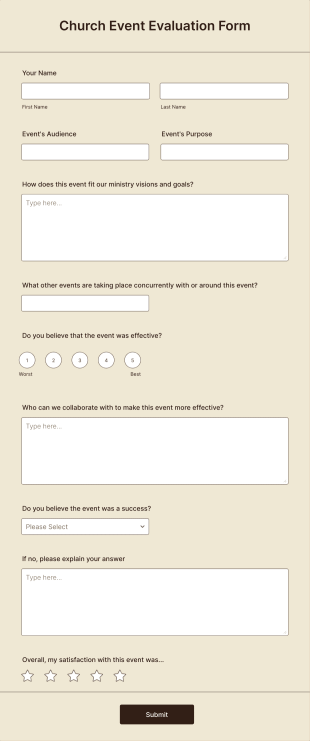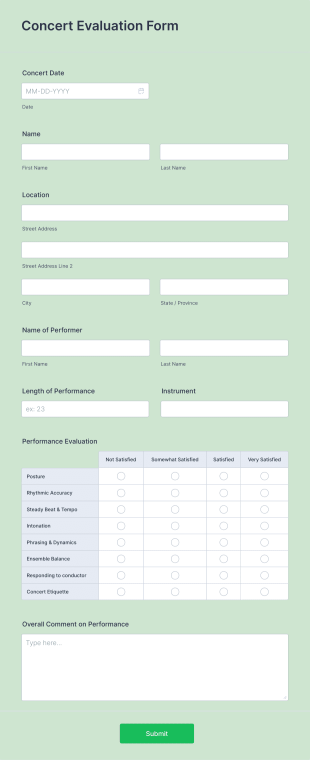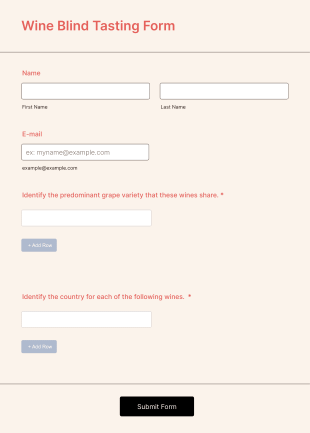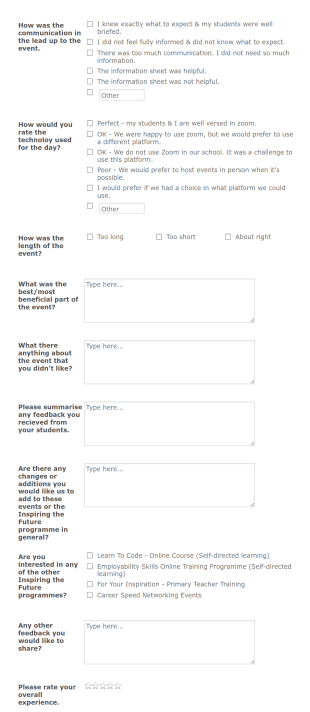Event Evaluation Forms
About Event Evaluation Forms
Event Evaluation Forms are specialized tools designed to collect feedback from attendees, organizers, and stakeholders after an event has taken place. These forms are essential for understanding participant satisfaction, identifying areas for improvement, and measuring the overall success of events such as conferences, workshops, seminars, fundraisers, and social gatherings. By gathering insights on aspects like event organization, content quality, speaker effectiveness, venue, and logistics, event planners can make data-driven decisions for future events. Event Evaluation Forms can be tailored for different audiences, including guests, sponsors, volunteers, and staff, ensuring comprehensive feedback from all perspectives.
With Jotform, creating and managing Event Evaluation Forms becomes a seamless process. Jotform’s intuitive drag-and-drop Form Builder allows users to quickly design custom evaluation forms without any coding knowledge. Users can choose from a wide range of ready-made templates or build their own forms from scratch, adding fields, rating scales, and open-ended questions as needed. Submissions are automatically organized in Jotform Tables, making it easy to analyze feedback and generate reports. Integration with other tools and real-time notifications further streamline the feedback collection process, helping event organizers enhance their future events efficiently.
Use Cases of Event Evaluation Forms
Event Evaluation Forms serve a variety of purposes, depending on the type of event and the feedback required. They are invaluable for event organizers, HR departments, marketing teams, educational institutions, and nonprofit organizations seeking to improve their events and demonstrate value to stakeholders. Here’s how these forms can be adapted for different scenarios:
1. Possible Use Cases:
- Post-Event Attendee Feedback: Gather opinions from participants about the event’s content, speakers, and logistics.
- Speaker/Presenter Evaluation: Collect feedback specifically about individual sessions or speakers.
- Volunteer and Staff Feedback: Assess the experience of those who helped organize or run the event.
- Sponsor and Vendor Feedback: Understand the satisfaction of sponsors and vendors regarding their involvement.
- Training or Workshop Assessment: Evaluate the effectiveness of educational or training sessions.
2. Problem Solving Points:
- Identify strengths and weaknesses in event planning and execution.
- Measure attendee satisfaction and engagement.
- Collect actionable suggestions for future improvements.
- Demonstrate event impact to stakeholders and sponsors.
3. Possible Owners and Users:
- Event planners and coordinators
- Corporate HR and training departments
- Nonprofit organizations
- Educational institutions
- Marketing and PR teams
4. Differences of Creation Methods:
- Attendee Feedback Forms may include rating scales, multiple-choice questions, and open-ended feedback.
- Speaker Evaluation Forms often focus on session content, delivery, and relevance.
- Volunteer Feedback Forms might ask about communication, support, and overall experience.
- Sponsor/Vendor Forms could include questions about ROI, exposure, and event logistics.
- The content and fields should be tailored to the specific audience and objectives of the evaluation.
In summary, Event Evaluation Forms are versatile tools that can be customized for various feedback needs, ensuring that every aspect of an event is assessed and improved upon.
How to Create an Event Evaluation Form
Creating an effective Event Evaluation Form is crucial for gathering meaningful feedback and driving continuous improvement in your event planning process. With Jotform, you can easily design, customize, and distribute evaluation forms tailored to your specific event and audience. Here’s a step-by-step guide to help you get started:
1. Choose Your Starting Point:
- Log in to your Jotform account and click on “Create” from your My Workspace page.
- Select “Form” and decide whether to start from scratch or use one of Jotform’s 10,000+ templates. For event evaluations, you’ll find templates for attendee feedback, speaker reviews, and more.
2. Select the Appropriate Layout:
- Choose between a Classic Form (all questions on one page) or a Card Form (one question per page). For longer evaluations, Card Forms can improve user experience by making the process feel less overwhelming.
3. Add and Customize Form Elements:
- Click on the “Add Element” menu to drag and drop fields such as:
- Rating scales (e.g., 1-5 stars for satisfaction)
- Multiple-choice and dropdown questions (e.g., “Which session did you enjoy most?”)
- Open-ended text fields for detailed feedback
- Yes/No or Likert scale questions for quick assessments
- For specific use cases:
- Attendee Forms: Focus on overall event experience, logistics, and content.
- Speaker Evaluation: Include questions about presentation skills, knowledge, and engagement.
- Volunteer/Staff Feedback: Ask about training, support, and communication.
- Sponsor/Vendor Feedback: Inquire about ROI, exposure, and event organization.
4. Personalize the Design:
- Use the Form Designer (paint roller icon) to match your form’s colors, fonts, and branding.
- Add your organization’s logo and customize the thank-you page to express appreciation for feedback.
5. Set Up Email Notifications:
- In the Settings menu, configure email notifications to alert you when new responses are submitted.
- Set up autoresponder emails to thank respondents for their input.
6. Publish and Share Your Form:
- Click on the “Publish” tab to copy your form link or embed it on your event website.
- Share the form via email, social media, or QR codes at the event venue.
7. Test and Monitor Submissions:
- Preview your form and submit a test entry to ensure everything works as intended.
- Monitor responses in Jotform Tables, where you can filter, sort, and analyze feedback.
8. Analyze and Act on Feedback:
- Use Jotform’s reporting tools to generate charts and summaries.
- Share insights with your team and implement improvements for future events.
By following these steps, you can create a comprehensive Event Evaluation Form that captures valuable feedback, helping you deliver better events every time.
Frequently Asked Questions
1. What is an Event Evaluation Form?
An Event Evaluation Form is a survey or questionnaire used to collect feedback from attendees, organizers, or other stakeholders after an event. It helps assess the event’s success and identify areas for improvement.
2. Why are Event Evaluation Forms important?
They provide valuable insights into attendee satisfaction, event logistics, and content quality, enabling organizers to make data-driven decisions for future events.
3. What information should be included in an Event Evaluation Form?
Typical fields include event satisfaction ratings, feedback on speakers or sessions, suggestions for improvement, and demographic information about respondents.
4. Are there different types of Event Evaluation Forms?
Yes, forms can be tailored for attendees, speakers, volunteers, sponsors, and vendors, each focusing on their unique experiences and perspectives.
5. Who should use Event Evaluation Forms?
Event planners, corporate teams, educational institutions, nonprofits, and anyone organizing events can benefit from using these forms to gather feedback.
6. How is the privacy of responses ensured?
With platforms like Jotform, data is securely stored and can be protected with encryption, password protection, and compliance with privacy regulations.
7. Can Event Evaluation Forms be anonymous?
Yes, forms can be set up to collect anonymous feedback, encouraging honest and candid responses from participants.
8. How soon should Event Evaluation Forms be sent after an event?
It’s best to distribute the forms immediately after the event while the experience is fresh in participants’ minds, ensuring more accurate and detailed feedback.
























